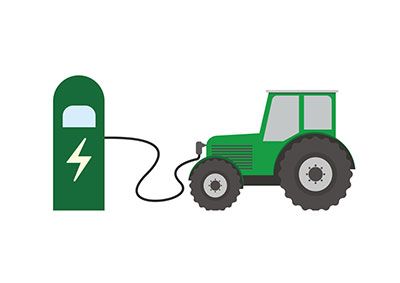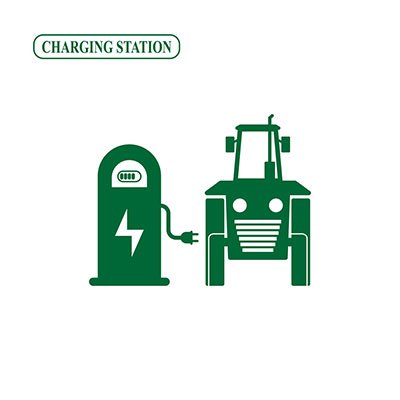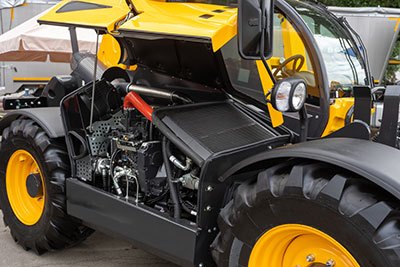As concerns about environmental sustainability and climate change intensify, the agricultural industry is turning to new current technology to reduce its carbon footprint.
One of the most promising new developments in this field is the electric tractor. Electric tractors are a clean and quiet alternative to traditional gas tractors.
Whether you’re a small-scale farmer looking to reduce your carbon footprint or a large agricultural company looking for ways to be more sustainable, electric tractors are a technology worth exploring.
Take away key points:
- All electric tractors offer a more eco-friendly solution for agricultural businesses compared to traditional gasoline-powered models that require fossil fuels energy and a power source
- Temperature, state of charge when starting, and how often charging is stopped and resumed during the process can all affect the total charging time.
- Many of the innovative electric tractors have developed the function for automation. The driver-optional automation is not there to replace the operator completely but to give the best possible performance.
- Electric tractors provide improved performance, increased efficiency, and reduced environmental impact.
Table of Contents
- How do electric tractors work? Understanding the technology
- The benefits of switching to electric tractors
- Future development of electric tractors
- Top manufacturers of electric tractors
- Electric tractors vs. Gas tractors: Which is the better choice?
- Are electric tractors realistic for farmers?
- FAQs
- Conclusion
How do electric tractors work? Understanding the technology
First and foremost, it’s important to note that electric tractors operate on battery power rather than gasoline or diesel tractor fuel. Most of the time, a standard electrical outlet at a charging station or the farm’s electricity supply is used to charge the battery.
The battery powers an electric motor, which is responsible for driving the tractor’s wheels through a series of gears and axles. Electric motors are very efficient, so electric tractors can put out a lot of torque and power while only using a small amount of energy.
Electric tractors have more than just an electric motor and battery. They also have a number of electronic and computer parts. These parts work together to monitor the tractor’s performance, make the best use of its energy, and give the farmer or operator real-time data and analytics.

The benefits of switching to electric tractors
1. Lower emissions
One of the most obvious and well-documented benefits of electric tractors is that they produce zero emissions for the farm. This is in stark contrast to their gas-powered counterparts, which release a significant amount of pollutants into the air every time they’re used.
By simply switching to electric tractors, farmers can make a significant contribution to reducing greenhouse gas emissions and protecting the environment.
2. Reduced energy costs
Electric tractors are incredibly cost-effective to operate, with lower energy costs compared to their combustion engine counterparts. The cost of electricity is generally lower than that of gas or diesel fuel, which can translate into significant savings for farmers in the long run.
3. Reduced noise pollution
Unlike gas-powered tractors, electric tractors are much quieter in operation. This can be particularly beneficial for farmers who operate near residential areas, as it can help reduce noise pollution and minimize disturbances to nearby neighbors.
4. Improved efficiency
Because electric farm tractors don’t rely on combustion engines, they’re able to provide consistent power without the need for idle or warm-up time. This makes them more efficient in terms of both energy usage and overall productivity. Why you lounge in the tractor seat, you can achieve successful farming practices and increase productivity.
5. Low maintenance costs
Electric farm tractors have fewer moving parts compared to gas-powered tractors, which typically results in lower maintenance costs. There’s no need for oil changes or other costly engine maintenance tasks, resulting in significant savings over time.
Future development of electric tractors

Increased battery capacity: As with all electric vehicles, one of the key challenges facing electric farm tractors machines is battery capacity. However, as battery technology continues to improve, we can expect to see significant strides in this area in the coming years. This will make it possible for electric tractors to operate for longer periods of time before requiring a recharge.
Improved charging infrastructure: To support the growth of electric farm tractors, more investment in charging infrastructure will be needed. In the future, we can expect to see the development of larger, more efficient charging stations that are specifically designed for agricultural applications.
Greater precision: Electric tractors are already highly efficient and precise, but there’s always room for improvement. As technology advances, we can expect to see electric tractors that are even more precise and accurate, enabling farmers to achieve higher yields and more consistent results.
Integration with other technologies: As the agriculture industry becomes more technology-driven, we can expect to see greater integration developed between electric tractors and other technologies such as GPS, advanced sensors, automation, and data analytics. This will allow farmers to collect more data about their operations, make more informed decisions, and achieve even better results.
Continued improvements in design: Electric tractor machines have already come a long way in terms of design, but there’s still room for electrification improvement. In the future, we can expect to see electric tractors that are even more ergonomic, user-friendly, and tailored to the specific needs and preferences of farmers.
Top manufacturers of electric tractors
John Deere: John Deere is one of the biggest names in agriculture equipment. They’ve recently begun offering several electrification tractor models, including the SESAM (Sustainable Energy Supply for Agricultural Machinery). These machines models by John Deere are designed to operate on all types of farms, from small to large, making it easier for farmers to switch to more sustainable operations.
Kubota: Kubota is a Japanese brand that offers a comprehensive lineup of electric tractors, including everything from small utility tractors to larger models designed for demanding tasks. These tractors are known for their reliability, durability, and eco-friendliness.
New Holland: New Holland offers several electric tractor models, including the NH2, which was introduced in 2010 production. This model is designed for small-scale farmers and is known for its low emissions and efficiency.
Kuhn: Kuhn is a French brand that offers several electric tractors, including the Metris production. The Metris is a small, lightweight tractor that’s perfect for use in vineyards, orchards, or other tight spaces.
McCormick: McCormick is an Italian brand that offers several electric tractor models, including the X7.6 production. This model is designed for larger farms and is known for its versatility and efficiency.
Monarch tractor: The MK V Tractor is a state-of-the-art electric tractor designed for use in agricultural applications. This Monarch tractor model boasts a two-speed gearbox and variable wheelbase for improved maneuverability and performance, as well as a lithium battery pack with increased efficiency and extended charge times.
Electric tractors vs. Gas tractors: Which is the better choice?
When it comes to choosing between electric and gas tractors, there’s no easy answer.
Both types of tractors have their pros and cons, and the best choice depends on a number of things, like the size of the operation, power, the tasks that need to be done, and the charging infrastructure that is available for farming.
That said, here are some of the key factors to consider when deciding between electric and gas tractors:
1. Carbon emissions
One of the most obvious advantages of electric tractors is that they produce zero emissions, compared to gas tractors which produce significant amounts of greenhouse gases. This makes electric tractors a great choice for farmers who want to minimize their carbon footprint for farming.
2. Energy efficiency
Electric tractors are generally more energy-efficient compared to gas tractors, since electric motors can deliver power more efficiently than combustion engines. This can result in significant cost savings over time.

3. Noise pollution
Electric tractors are much quieter compared to gas tractors, which can be a benefit for farmers who operate close to residential areas or who work during night hours.
4. Cost
Electric tractors can be more expensive compared to gas tractors, although this price difference is mitigated through the lower operating costs and maintenance costs associated with electric tractors.
5. Charging infrastructure
Depending on the size of the operation, the availability of charging infrastructure can be a major factor in deciding whether to choose electric or gas tractors.
Charging infrastructure can be expensive to install, especially for larger operations, and there may be range limitations for electric tractors in areas without charging infrastructure.
Are electric tractors realistic for farmers?
As electric tractors become more popular, many farmers are wondering whether they’re a realistic option for their operations. One of the most important factors to consider is cost.
1. Purchase price
Electric tractors can be more expensive compared to gas tractors. For example, an electric tractor with similar capabilities to a gas tractor that costs $40,000 could cost $60,000 or more of the base price. However, purchase prices are expected to decrease as technology advances and production increases.
2. Energy costs
Even though they cost more to buy, electric tractors can be cheaper to run over time because they use less energy.
Electricity is usually cheaper than gas, and electric tractors are much more efficient than gas tractors. This means that they use much less energy to do the same work as a gas tractor.
3. Maintenance costs
Electric tractors have fewer moving parts compared to gas tractors, which translates to lower maintenance costs. There’s no need for regular oil changes or other engine maintenance tasks, which can result in significant savings over time.
4. Charging infrastructure
As mentioned earlier, the availability of charging infrastructure can be a factor in the cost of owning an electric tractor. Installing a charging station can be a significant expense, especially for larger operations.
Charging stations are becoming more common as more businesses and governments work to improve the infrastructure for EVs.
5. Total cost of ownership
When factoring in all of these costs, it’s difficult to predict whether electric tractors will be a more costly or cost-effective option for farmers.
However, it’s clear that electric tractors have different cost structures compared to gas tractors, and it’s worth considering these differences when making a decision.
FAQs
Are there any electric tractors?
Yes, there are electric tractors available in the market today.
Several manufacturers, including John Deere, Kubota, New Holland, Kuhn, and McCormick, offer a range of electric tractor models.
Is John Deere going to build electric tractors?

John Deere has recently announced that it will be producing electric tractors in the near future.
The company has already rolled out its first electric tractor model, the 8400E, and is continuously developing new models to meet the needs of its customers.
Does Kubota make electric tractors?
Yes, Kubota has a range of electric tractors available on the market.
The company’s lineup includes the LX Series and GR Series electric tractor models, both designed to meet the needs of farms and other agricultural businesses.
What is the cost of an EV tractor?
The cost of an electric tractor depends on a variety of factors, such as make and model, the battery type and size, as well as additional features.
Generally speaking, electric tractors can range from around $10,000 for entry-level models to upwards of $40,000 of the base price for more advanced versions.
Are electric tractors feasible?
Yes, farmers and agricultural businesses that want to reduce their impact on the environment can use electric tractors.
Electric tractors have a lot of advantages over gas-powered ones, like a smaller carbon footprint, less noise, more torque, and better efficiency.
How long does it take to charge an electric tractor?
The charging time of an electric tractor will vary depending on the model and battery type. Generally, most electric tractors require between 4-6 hours to fully charge their batteries. However, some models can be charged in as little as 2–3 hours with a fast charger.
Conclusion
In conclusion, electric tractors are becoming a better choice for modern farmers because they are better for the environment and work better.
With recent improvements in battery technology and longer charging times, electric tractors offer a real way for agricultural businesses to reduce their carbon footprint while still doing a good job.

seems like no one looks at the before and after picture.
how much energy does it take to get the precious minerals/ metals needed to build the battery.
what do you do with the battery after it is no longer any good?
cost of battery replacement is another concern.
i cant see that any of this is saving anything.